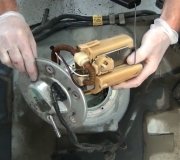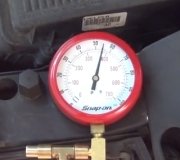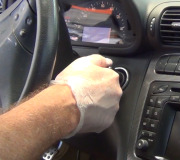The fuel pump has nothing to do with fuel consumption. In a very rare case it can contribute to low fuel consumption with poor engine performance. I don't know how big your gas tank is or how far you're getting on each gallon or liter, but there are two things to consider.
First of all, on a flat surface with the car in neutral, you should be able to push it by hand. If you can not, suspect a dragging brake. That is most commonly caused by brake fluid that is contaminated with a petroleum product, but you would typically have a lot more problems than just high fuel consumption.
Next, your mechanic can connect a scanner to view live data, and among other things, it will show the short-term and long-term fuel trim numbers. That's "STFT" and "LTFT". If those numbers are near "0", that means the Engine Computer is neither adding nor subtracting fuel from the metering calculations programmed in at the factory, and the engine is running properly. If you find the short-term numbers are positive, that means that to get the right fuel / air mixture right now, the computer is adding fuel above what was programmed in at the factory. If the numbers are negative, it is subtracting some fuel to keep the desired mixture correct.
When the computer has to constantly keep on making the same corrections, it moves those numbers over to the long-term memory and uses those to run on instead of what was programmed in at the factory to start with. A little correction is normal and shows everything is working as designed. It's when those numbers are real high that something is causing too much or too little fuel to be calculated as needed, and the computer is correcting for that. That's when you need a mechanic to determine the cause.
That fine tuning of the fuel metering is based on the readings from the oxygen sensor, and those can also be seen on the scanner. Once the engine is warmed up, it should be switching between "rich" and "lean" about once or twice per second. If it stays "rich" a lot more than "lean", too much fuel is being used but the computer is not able to correct it. Based on the oxygen sensor readings, the computer can only modify fuel metering by roughly plus or minus ten percent. If the fuel trim numbers are high negative and the oxygen sensor is showing it's running too rich, the computer has lost control of the mixture and is trying but is unable to correct it enough. That's when you have to start looking at the other sensors to see why they're calling for so much fuel, and you have to look for other causes like low tire pressure and dragging brakes.
Don't overlook worn spark plugs too. At the mileage you listed, they should have been changed by now. The Engine Computer can detect if a cylinder is misfiring, and it will set a diagnostic fault code to tell you which cylinder that is, and it will turn on the Check Engine light. That misfire has to occur often enough to set a fault code. Until it gets that bad, it will still be costing you fuel mileage.
SPONSORED LINKS
Tuesday, January 14th, 2014 AT 4:03 AM




